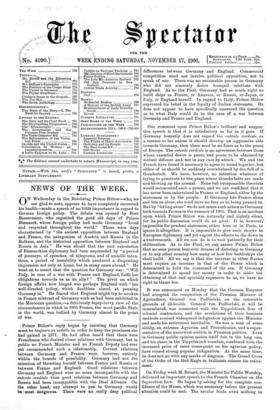Our comment upon Prince Billow's brilliant and sugges- tive speech
is that it is satisfactory as far as it goes. If Germany honestly does not regard the entente cordiale as a menace to her unless it should develop an aggressive side towards Germany, then there need be no fears as to the peace of Europe. The entente cordiale is an agreement between those whose essential desire is peace, and peace to-be obtained by mutual defence and not in any case by attack. We and the French have found it necessary to agree to stand together, lest either of us should be suddenly overwhelmed by the fall of a thunderbolt. We have, however, no intention whatever of trying to penetrate to the place where thunderbolts are made and blowing up the arsenal. None but irresponsible theorists would recommend such a course, and we are confident that it has never been entertained in France or England, either by the statesmen or by the people. If Germany lets France alone and lets us alone, she need have no fear as to being penned in. But by "letting alone" we do not mean such action as Germany took towards France in the summer of 1905. That is an incident upon which Prince Billow was naturally and rightly silent, for its public discussion could do no good. It is, however, impossible for prudent statesmen, either here or in Paris, to ignore it altogether. It is impossible to give such shocks to European diplomacy and yet expect the effects to die down in a twelvemonth. All we can do is to wait patiently for their . obliteration. As to the Fleet, we can assure Prince Billow that no sane person here ever dreams of dictating to Germany or to any other country how many or how few battleships she shall build. All we say is that the increase in other Navies must require an increase in that of the Power which is determined to hold the command of the sea. If Germany is determined to spend her money in order to make the obtaining of that end specially expensive to us, we have no right to blame her.


























































 Previous page
Previous page